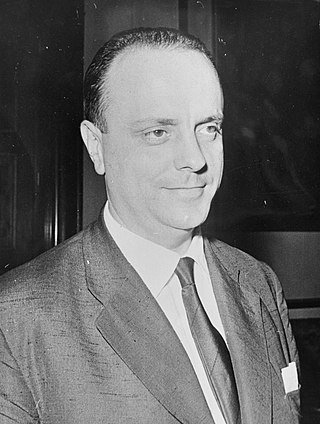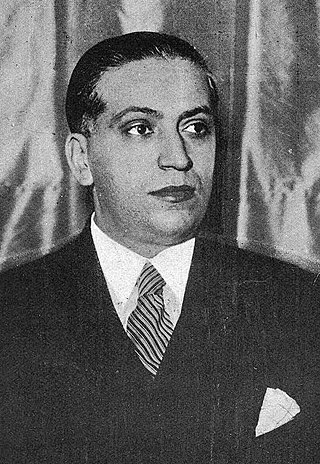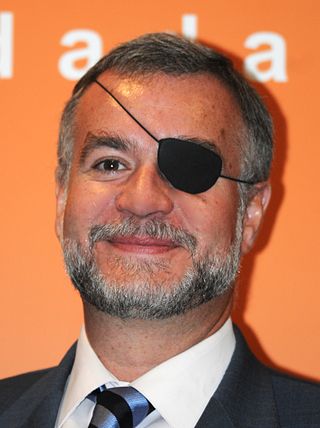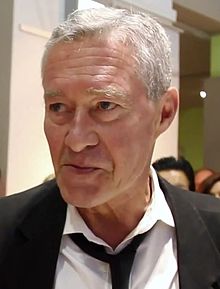
Manuel Fraga Iribarne was a Spanish professor and politician during the dictatorship of Francisco Franco, who was also one of the founders of the People's Party. Fraga was Minister of Information and Tourism between 1962 and 1969, Ambassador to the United Kingdom between 1973 and 1975, Minister of the Interior in 1975, Second Deputy Prime Minister between 1975 and 1976, President of the People's Alliance/People's Party between 1979 and 1990 and President of the Regional Government of Galicia between 1990 and 2005. He was also a Member of the Congress of Deputies and a Senator.

The People's Party is a conservative and Christian-democratic political party in Spain.

José Calvo Sotelo, 1st Duke of Calvo Sotelo, GE was a Spanish jurist and politician. He was the minister of finance during the dictatorship of Miguel Primo de Rivera and a leading figure during the Spanish Second Republic. During this period, he became an important part of Spanish Renovation, a monarchist movement. Calvo Sotelo's assassination in July 1936 by the bodyguard of PSOE party leader Indalecio Prieto was an immediate prelude to the triggering of the Spanish military coup of July 1936 that was plotted since February 1936, the partial failure of which marked the beginning of the Spanish Civil War.

The 1989 Spanish general election was held on Sunday, 29 October 1989, to elect the 4th Cortes Generales of the Kingdom of Spain. All 350 seats in the Congress of Deputies were up for election, as well as 208 of 254 seats in the Senate. An election had not been due until 28 July 1990 at latest, but Prime Minister Felipe González called for a snap election nine months ahead of schedule, allegedly on the need of implementing tough economic measures. González hoped to capitalize on a still strong economy and his party's electoral success in a European Parliament election held in June, after a troubled legislature which had seen an increase of social protest on his government's economic policy and the calling of a massive general strike in 1988.

The 1986 Spanish general election was held on Sunday, 22 June 1986, to elect the 3rd Cortes Generales of the Kingdom of Spain. All 350 seats in the Congress of Deputies were up for election, as well as 208 of 254 seats in the Senate.

The Leader of the Opposition is an unofficial, mostly conventional and honorary title frequently held by the leader of the largest party in the Congress of Deputies—the lower house of the Spanish parliament, the Cortes Generales—not within the government. They are usually the person who is expected to lead that party into the next general election.

The 1987 European Parliament election in Spain was held on Wednesday, 10 June 1987, to elect the MEP delegation from the country for the 2nd European Parliament. All 60 seats allocated to Spain as per the 1985 Treaty of Accession were up for election. The election was held simultaneously with regional elections in thirteen autonomous communities and local elections all throughout Spain.

The 1989 European Parliament election in Spain was held on Thursday, 15 June 1989, as part of the EU-wide election to elect the 3rd European Parliament. All 60 seats allocated to Spain as per the 1985 Treaty of Accession were up for election.

The 1982 Andalusian regional election was held on Sunday, 23 May 1982, to elect the 1st Parliament of the autonomous community of Andalusia. All 109 seats in the Parliament were up for election.
In the run up to the 1986 Spanish general election, various organisations carried out opinion polling to gauge voting intention in Spain during the term of the 2nd Cortes Generales. Results of such polls are displayed in this article. The date range for these opinion polls is from the previous general election, held on 28 October 1982, to the day the next election was held, on 22 June 1986.

The 1981 Galician regional election was held on Tuesday, 20 October 1981, to elect the 1st Parliament of the autonomous community of Galicia. All 71 seats in the Parliament were up for election. The election was held simultaneously with a Statute of Autonomy referendum in Andalusia.
In the run up to the 1982 Spanish general election, various organisations carried out opinion polling to gauge voting intention in Spain during the term of the 1st Cortes Generales. Results of such polls are displayed in this article. The date range for these opinion polls is from the previous general election, held on 1 March 1979, to the day the next election was held, on 28 October 1982.

The 1983 Cantabrian regional election was held on Sunday, 8 May 1983, to elect the 1st Regional Assembly of the autonomous community of Cantabria. All 35 seats in the Regional Assembly were up for election. The election was held simultaneously with regional elections in twelve other autonomous communities and local elections all throughout Spain.

Traditionalism is a Spanish political doctrine formulated in the early 19th century and developed until today. It understands politics as implementing Catholic social teaching and the social kingship of Jesus Christ, with Catholicism as the state religion and Catholic religious criteria regulating public morality and every legal aspect of Spain. In practical terms it advocates a loosely organized monarchy combined with strong royal powers, with some checks and balances provided by organicist representation, and with society structured on a corporative basis. Traditionalism is an ultra-reactionary doctrine; it rejects concepts such as democracy, human rights, constitution, universal suffrage, sovereignty of the people, division of powers, religious liberty, freedom of speech, equality of individuals, and parliamentarism. The doctrine was adopted as the theoretical platform of the Carlist socio-political movement, though it appeared also in a non-Carlist incarnation. Traditionalism has never exercised major influence among the Spanish governmental strata, yet periodically it was capable of mass mobilization and at times partially filtered into the ruling practice.

José Javier Esparza Torres is a Spanish journalist, essayist and cultural critic.
Isidro Juan Palacios Tapias is a Spanish editor, author, philologist and teacher of oratory. Linked to the Nouvelle Droite (ND), he was a member of the now disbanded neo-nazi CEDADE.
The history of the far-right in Spain dates back to at least the 1800s and refers to any manifestation of far-right politics in Spain. Individuals and organizations associated with the far-right in Spain often employ reactionary traditionalism, religious fundamentalism, corporate Catholicism, and fascism in their ideological practice. In the case of Spain, according to historian Pedro Carlos González Cuevas, the predominance of Catholicism played an essential role in the suppression of external political innovations such as Social Darwinism, positivism, and vitalism in Spanish far-right politics.
Julio Gil Pecharromán is a Spanish historian, specialising in the political history of 20th-century Spain.

A motion of no confidence in the Spanish government of Felipe González was debated and voted in the Congress of Deputies between 26 and 30 March 1987. It was proposed by People's Alliance (AP) leader Antonio Hernández Mancha, motivated on the "deteriorating situation of the country" as a result of the social conflict sparked throughout the 1986–87 winter between the governing Spanish Socialist Workers' Party (PSOE) and its erstwhile allied Workers' General Union (UGT), which had grown increasingly critical of González's economic policies. However, the motion's true motives were attributed to Mancha's need for public promotion as both AP and opposition leader after his recent election to the post, as well as to his party's perceived urge to vindicate its primacy within the centre-right political spectrum in Spain amid the internal crisis that had been beleaguering it in the previous months.

Lilith Verstrynge Revuelta is a Spanish former politician. The daughter of Jorge Verstrynge, with whom she shared membership of Podemos, she served in the Congress of Deputies for six months up to January 2024, and was Secretary of State for the 2030 Agenda from July 2022 to November 2023.















